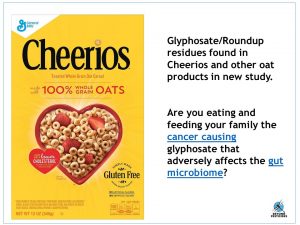08
Nov
Study Confirms Chemical-Intensive Production Contaminates Organic with Glyphosate
 (Beyond Pesticides, November 8, 2018) Two months after publishing its first series of tests, part two of an Environmental Working Group (EWG) study finds residues of Roundup’s active ingredient, glyphosate, in all General Mills’ Cheerios and PepsiCo’s Quaker Oats products sampled. Health advocates are expressing concern about the consequences of chronic glyphosate exposure, and say U.S. federal agencies must limit the herbicide’s use on oat-based breakfast foods regularly marketed to children. In addition, organic itself is under threat, as chemical-intensive management practices undermine the future of the growing organic movement.
(Beyond Pesticides, November 8, 2018) Two months after publishing its first series of tests, part two of an Environmental Working Group (EWG) study finds residues of Roundup’s active ingredient, glyphosate, in all General Mills’ Cheerios and PepsiCo’s Quaker Oats products sampled. Health advocates are expressing concern about the consequences of chronic glyphosate exposure, and say U.S. federal agencies must limit the herbicide’s use on oat-based breakfast foods regularly marketed to children. In addition, organic itself is under threat, as chemical-intensive management practices undermine the future of the growing organic movement.
In this second round of testing, EWG scientists purchased products around San Francisco and Washington DC. 28 samples of conventional and 16 samples of organic oat products were collected. Approximately 300 grams of each General Mills and PepsiCo product were packaged and shipped to Anresco Laboratories, in San Francisco. Detected glyphosate residues were compared to EWG’s own health benchmark of 160 parts per billion (ppb). This benchmark is based on risks of lifetime exposure and what EWG scientists consider allowable and protective of children’s health with an adequate margin of safety.
EWG’s results detected glyphosate residues in all 28 samples of conventionally grown oat products. The vast majority (all but two) of sampled products containing conventionally grown oats had residues well above 160 ppb. The highest level of glyphosate detected by the lab was 2,837 ppb in Quaker Oatmeal Squares breakfast cereal. Surprising to some, glyphosate was also detected in five of the 16 organic samples at concentrations of 10 ppb to 30 ppb. EWG notes that organic oats can be exposed by neighboring drift or at facilities where conventional oats are also processed. Any evidence indicating cross-contamination from conventional to organic underscores the urgency of protecting organic integrity.
“How many bowls of cereal and oatmeal have American kids eaten that came with a dose of weed killer?” asked EWG President Ken Cook in a press release. “That’s a question only General Mills, PepsiCo and other food companies can answer.”
In response, General Mills and Quaker Oats Company have gone on the defensive, insisting their products meet the legal standards. However, it is important to note that the U.S. Environmental Protection Agency’s (EPA) legal limit for glyphosate on oats, 30 parts per million, was set back in 2008. This was well before the International Agency for Research on Caner (IARC) cancer classification, or any of the recent Dewayne Johnson vs. Monsanto trials, in which glyphosate was shown to have caused a school groundkeeper to contract non-Hodgkin lymphoma. Advocates affirm outdated legal limits, not based on the best and most current science, fall short of adequately protecting public health.
Children and developing fetuses are particularly vulnerable to carcinogens and immune system suppressants. Repeated pesticide exposure increases susceptibility to disease later in life. Without strong protections in place, parents can be unknowingly feeding their children daily breakfasts tainted with toxic pesticide residues.
“Glyphosate and other cancer-causing chemicals,” says Mr. Cook, “simply don’t belong in children’s food, period.”
Many health and environmental advocates are calling for a glyphosate ban, in which products containing glyphosate are removed from the market. However, though glyphosate is troubling on its own, there are also other equally toxic pesticides and synthetic fertilizers that perpetuates “the pesticide-treadmill.” For comprehensive results, champion an organic systems approach wherever pesticides are routinely used. Calling glyphosate “the poster child for the bigger pesticide problem,” in “Decades of Deceit,” U.S. Right to Know investigative reporter Carey Gillam said, “I do think [glyphosate] is very representative of what is going on in terms of the way [pesticides have] been pushed, and the way [Monsanto] has manipulated public policy and the regulatory authority.”
Products manufacturers can expand markets for farmers through a commitment to source only organically grown ingredients. In the meantime, grassroots coalitions must continue holding companies accountable. The need for a global transition to regenerative, organic agriculture is urgent and ongoing. Instead of prolonging land management practices that lead to widespread weed resistance, consciously choose to avoid conventional products. Turn your lawn into an organic garden. Cook, share and enjoy organic foods for your friends and family whenevr possible.
All unattributed positions and opinions in this piece are those of Beyond Pesticides.
Source: Environmental Working Group











The oats used in Cheerios are non-GMO. But their life is terminated with RoundUp [glyphosate] that locks up the essential nutrients needed for a healthy life. Without chromium, insulin cannot get into cells to work. i.e. type 2 diabetes. Without cobalt, we cannot make Vitamin B-12 [cobalamin] which is needed for cell division and growth.
November 8th, 2018 at 4:03 pm[infertility in men, miscarriage in women, cancer, etc.] http://opinion.fartoomuch.info/CancerFungus.html http://NoGMO.FarTooMuch.Info i
EWG and PAN need to connect and work together to help resolve the major pestiside problem that is affecting the health of America and the rest of the world.
November 14th, 2018 at 9:17 amWake up the Government and the politicians that seems to ignoring this major problem. Sadly enough they are aware of it. It’s time to really drain the swamp!